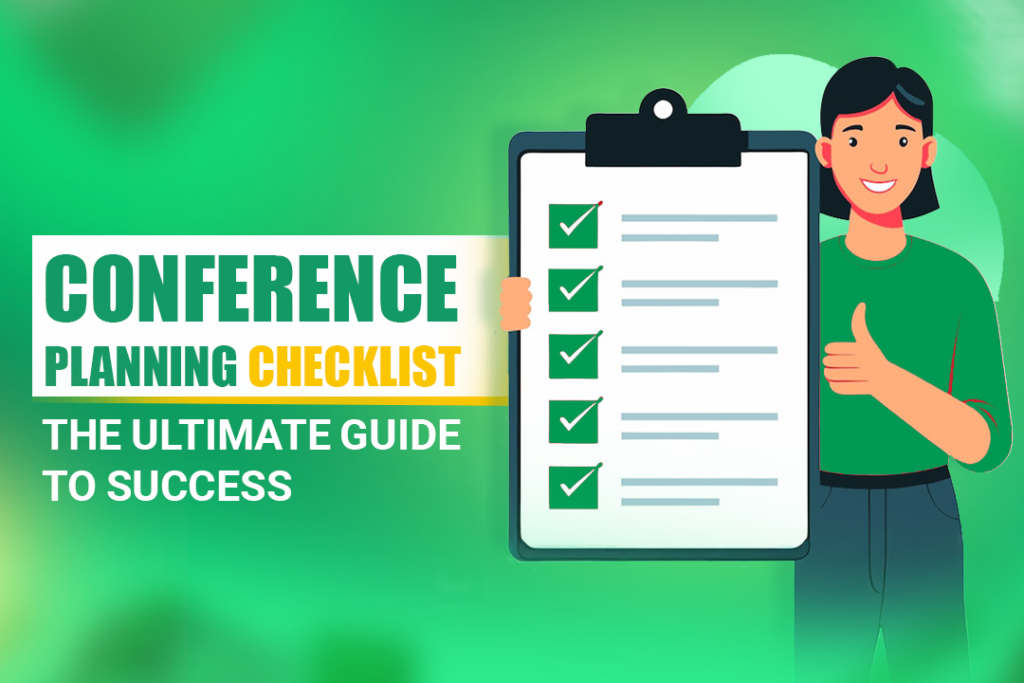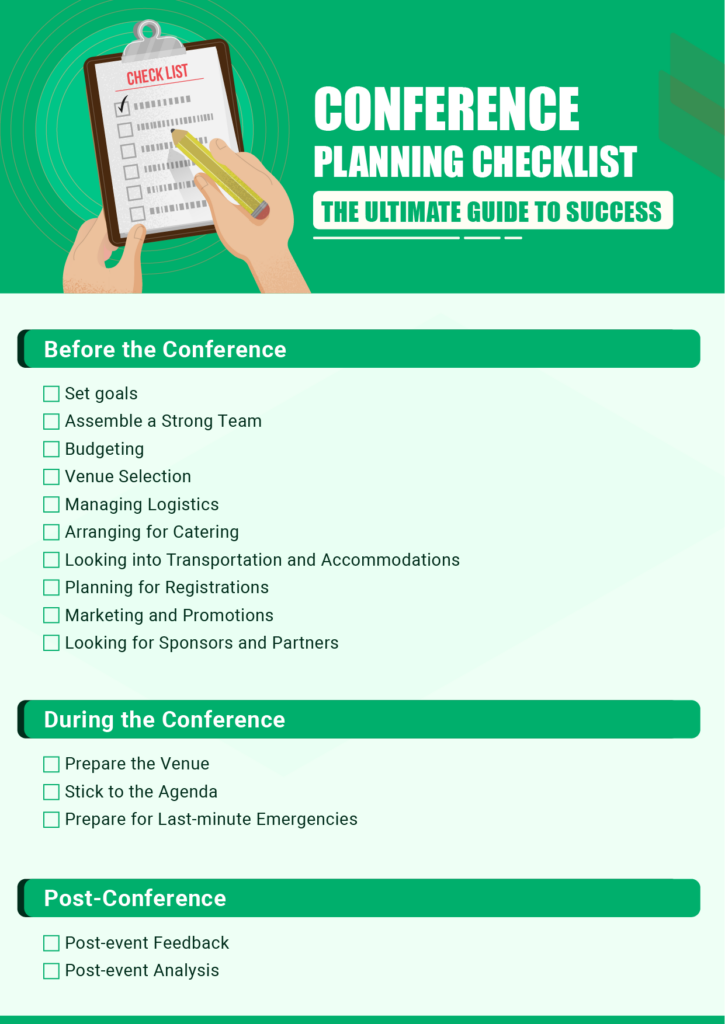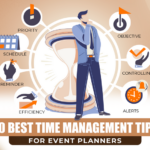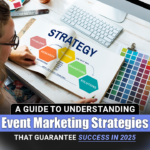
A conference requires months of planning, strategizing, and promotion to ensure its success. They are essential for businesses and working professionals and are usually well-attended. As an event manager, planning the event to the T to ensure the conference goes smoothly becomes crucial. For novice event planners, here is a guide to ensuring you create the perfect conference plan while covering everything that needs to be taken care of to organize a successful conference.
Here is a starter’s conference planning checklist to ensure you don’t miss out on anything while planning and organizing a conference for your clients.
Before The Conference
The pre-conference stage is one of the most crucial stages, as the whole blueprint of the event is created at this time. The whole event team comes together to create a memorable mega-conference for all event stakeholders. Make sure to include the pointers below in your conference planning checklist
Define the Goals and Objectives of the Conference
Every conference is planned to propagate some message, build relationships, solve problems, and understand new knowledge. Understand who your potential target audience is and their pain points, and set definitive goals and objectives that you aim to achieve through this conference.
Assemble a Strong Team
Your team is your army, so be strategic when choosing your team. Understand the strengths and weaknesses of every team member and decide who will handle which department in terms of event planning.

Budgeting
After understanding client requirements, discuss the tentative budget with them. Give them a reality check about their expectations if the budget they’re providing is less than what is required. Finally, arrive at a definitive budget and work with it. Your finance team will then start allocating the budget for every conference element. This includes the venue, accommodation, recreational experiences, speakers, catering, decorations, lighting, stalls, etc.
Venue Selection
Once you are clear about the budget and the total number of people you plan to invite to the conference, it is easy to shortlist potential venues. Your vendor manager or venue-in-charge will know the best possible venue options as per the budget. All you have to do is consider your options with the client and make your pick. Choose a venue near the airport or train station so your event attendees can get there quickly. Make sure the place can accommodate the number of attendees you plan to invite.
Managing Logistics
Logistics is everything when it comes to organizing an event. Your logistics manager is most likely the most loaded person on the team, juggling many things simultaneously. He manages all vendors, their on-time delivery, venue management, and more. As an event manager, you should ensure all the logistics-related duties are carried out smoothly and on time. Along with your operations/logistics manager, you could come up with some last-minute exigency plans right before the conference.
Arranging for Catering
Food is an essential part of any event, personal or corporate. Event attendees always talk about the food, and as an event planner, you want to ensure that you increase the probability of them saying good things about the food and drinks served at the event. After conducting numerous events, you have a list of competent caterers who serve finger-licking food to guests. Make the most of that list and finalize the caterer after discussing the details with your client.
Looking into Transportation and Accommodations
Your conference planning checklist cannot be completed without ticking off the transportation and accommodation arrangements. Once you receive registrations, you have a fair idea of the total number of attendees expected to attend the conference. You can then arrange for transportation and hotels accordingly. Your logistics manager will speak to hotels and homestays near the event venue and arrange a stay for the designated number of people. If the event location is far from the main airport and train station, you must arrange for pick-up and drop-off for all attendees traveling from different places for the conference.
Planning for Registrations
A typical registration table has a sign-in table, lanyards, notepads, a welcome sign, and event badges. If your conference has a specific theme, you can spruce up your registration process to align with that theme. Your welcome staff can be dressed in theme-appropriate clothing, and your online registration portals can be designed to resonate the same. One of the event reviews we received discussed the outstanding event venue design and the thematic synergy across all communication channels for the same. The reviewer enjoyed the conference because of the high experiential value derived through a theme-based event experience.
Marketing and Promotions
One of the most integral functions of an event management team is to handle the marketing and promotional activities for the conference weeks before the main event. Once the strategies and themes are in place for the event, the next step is to craft the core marketing messages and decide on the channels to use. Your event management software is your primary marketing tool before you optimize social media and other out-of-the-box marketing options for your conference. Read our blog about the top event management software for conferences to master marketing activities on them.
Looking for Sponsors and Partners
From the moment an event management company takes on the responsibility of planning a conference, they start looking for sponsors and partners to raise funds for the event. Usually, they already have a line-up of potential sponsors interested in supporting the event. They then start pitching to each of them and collecting the requisite event funds. Sometimes, the sponsors come through the client, making it easier for the event planners.
During the Conference
The time during the event is usually chaotic, and event teams put their heart and soul into making the event a success. Look at the three key things to include in your conference planning checklist.
Prepare the Venue
The event team is usually present days before the event until the last minute when changes or other happenings occur at the venue. Although this may not be ideal, the world of event management is dynamic; there are always last-minute changes either from the client or the sponsors and, in some cases, from the senior management of the event organization. As an event planner, you must be mentally prepared to face all this while preparing the venue for the event.
Stick to the Agenda
Usually, the event team prepares the agenda by considering the speakers and planning recreational activities. It is essential to follow the schedule to avoid chaos and dissonance during the event. Look at any of our negative event reviews; mismanagement is one of the top reasons for lousy attendee experience. As an event manager, you must ensure that everything goes according to the set agenda to ensure a smooth event experience for your team and attendees.
Prepare for Last-minute Emergencies
During the event planning stage, you should delegate all responsibilities to your team members and decide who will handle last-minute emergencies. You should give this responsibility to someone who can stay calm during the storm and effectively strategize to mitigate the on-ground problem.
Post-Conference
This is the final part of the conference, wherein you and your team will focus on what worked for the event and what didn’t. These are essential elements for your conference planning checklist.
Post-event Feedback
Every event has to be closely analyzed. This forms the basis for long-term event improvement. And as a team, you get to laud your strengths and work on your weaknesses. However, to achieve this, you have to get the requisite event experience-related data from your attendees as soon as possible so that they remember all the event details while filling out their post-event data forms. Ensure you have a mix of open and closed questions to get maximum input from your event attendees. To understand this better, refer to our blog on Conference Feedback.
Post-event Analysis
Once you have received all the requisite information, your post-event data analyst will collate all data and create a report stating details about the event, the sponsors, the miscalculations and challenges, and the scope for improvement. Refer to our blog, “Essential Elements to Consider for Your Next Post-Event Analysis Report.” to understand how to create an effective post-event analysis report.

Key Takeaway
The reason for conference planning is to guarantee the satisfaction of your attendees and realize your goals. Eventible’s ultimate conference planning checklist above is a reliable tool to guide you step by step as you plan your next event. We generated this comprehensive conference planning checklist from our in-depth experience; collating event reviews from attendees and other stakeholders.




Comments are closed.